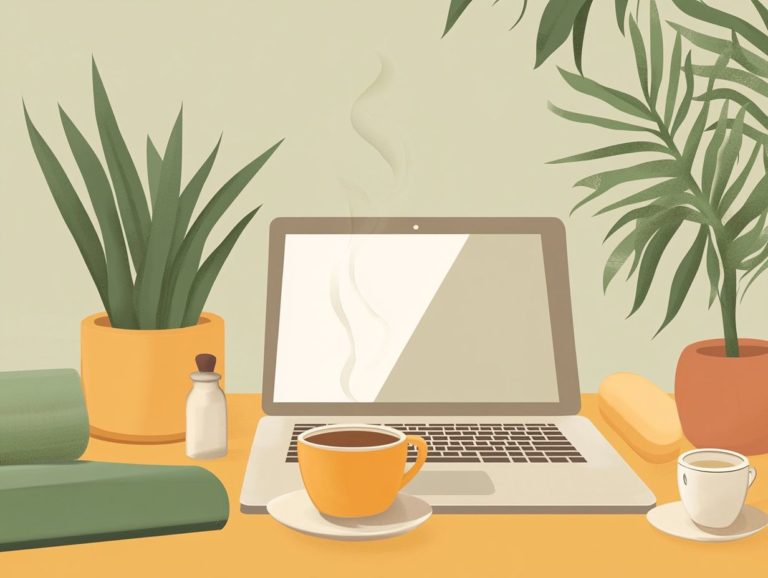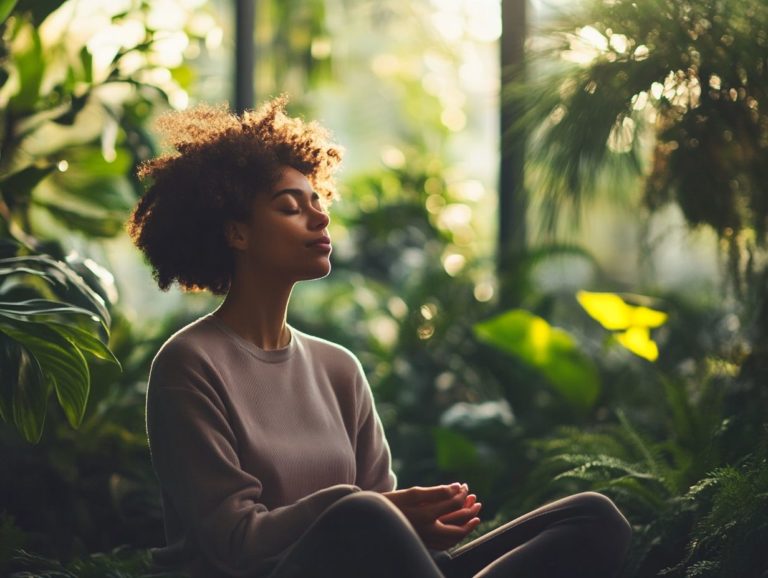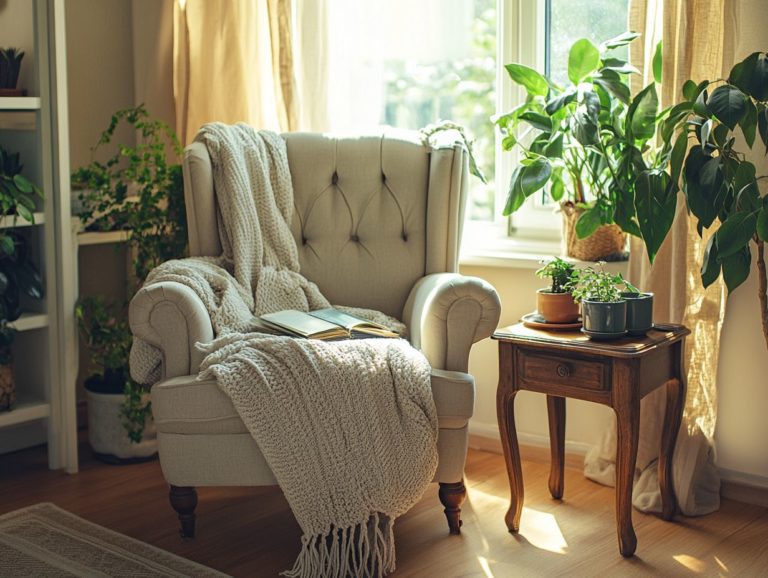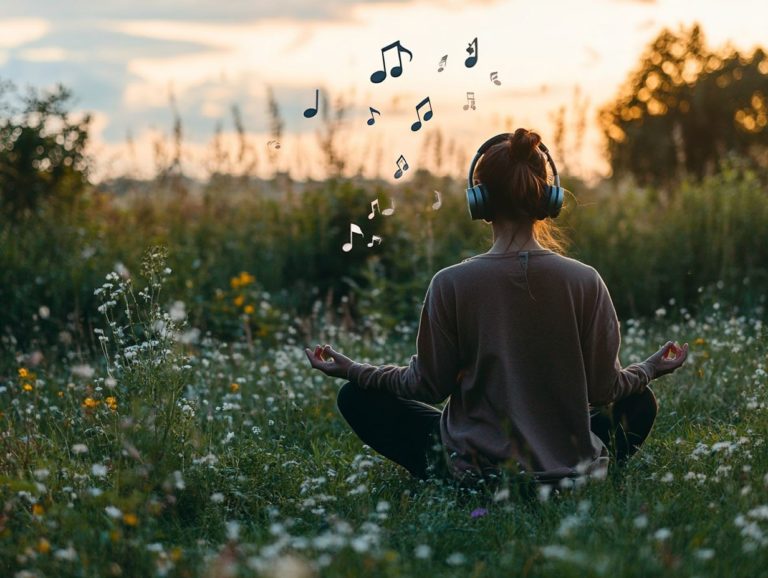The Science of Relaxation: How It Affects Your Body
In today’s fast-paced world, finding time to relax is crucial don t let it be a luxury!
However, grasping the significance of relaxation is essential for your overall well-being. Let s explore how relaxation can play a vital role in your life, covering everything from its physical effects on your body to its influence on your mental health.
You ll discover practical relaxation techniques and tips for seamlessly integrating these practices into your daily routine. This will ultimately help you cultivate a more balanced and serene lifestyle. Dive in to uncover how embracing relaxation can truly transform your life!
Contents
- Key Takeaways:
- The Importance of Relaxation
- The Physiology of Relaxation
- The Mental Benefits of Relaxation
- Practicing Relaxation Techniques
- Incorporating Relaxation into Daily Life
- Frequently Asked Questions
- What is the science behind relaxation and how does it affect the body?
- What are the physical benefits of relaxation?
- Can relaxation improve mental health?
- How does relaxation affect the nervous system?
- Are there different types of relaxation techniques?
- How often should one practice relaxation techniques?
Key Takeaways:
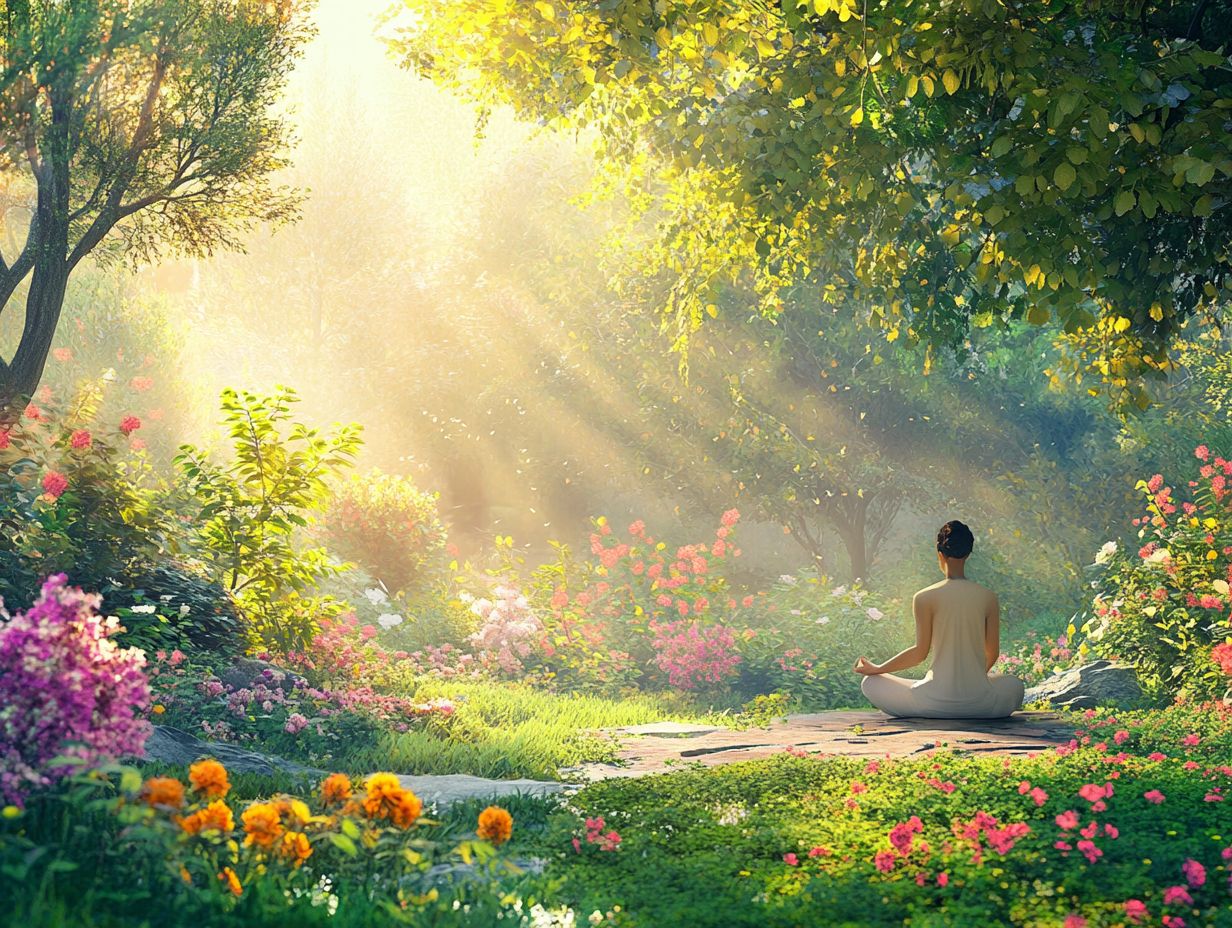
- Relaxation is crucial for our overall well-being, as it helps our bodies and minds function at their best.
- When we relax, our bodies release tension and promote physical healing, leading to reduced stress levels and improved mental health.
- Incorporating relaxation techniques into our daily lives can have numerous benefits, such as reducing stress, improving sleep, and promoting a more balanced lifestyle.
The Importance of Relaxation
The importance of relaxation in your life cannot be overstated; it plays a crucial role in managing stress, enhancing your mental health, and elevating your overall quality of life.
Engaging in effective relaxation techniques can lead to a significant decrease in stress hormones. This promotes a beneficial relaxation response, which is your body’s way of calming down and reducing stress, fostering emotional well-being. To enhance your understanding, check out our resource on understanding detoxification.
By incorporating practices such as deep breathing, mindfulness, and progressive muscle relaxation into your daily routine, you can unlock profound benefits that go beyond simply alleviating fatigue. This contributes to a holistic improvement in your health, including pain relief.
Understanding the Role of Relaxation in Our Lives
Understanding the importance of relaxation techniques in your life is crucial for promoting psychological well-being and enhancing emotional comfort. These techniques act as essential tools for alleviating stress and anxiety, offering you a much-needed escape from the daily grind.
Incorporating practices like mindfulness, deep breathing, or gentle yoga into your routine allows you to navigate your emotional landscape with greater ease. This not only helps reduce feelings of discomfort but also builds resilience against life s challenges.
Ultimately, embracing relaxation is not merely a luxury; it is vital for achieving a balanced lifestyle and enhancing your overall quality of life. This journey toward tranquility opens the door to clearer thinking, enriched relationships, and a renewed capacity to handle everyday pressures.
The Physiology of Relaxation
The physiology of relaxation involves a complex interaction of biological responses triggered by various relaxation techniques, all of which can greatly enhance your physical health and lower the risk of heart disease and other stress-related conditions.
When you immerse yourself in practices like deep breathing, tai chi, or yoga, your body activates the relaxation response. This powerful mechanism counters stress hormones and improves blood flow. It alleviates muscle tension and enhances your overall bodily functions, setting the stage for a healthier, more balanced life. Understanding the science of detoxification can further support these benefits.
How Our Bodies Respond to Relaxation
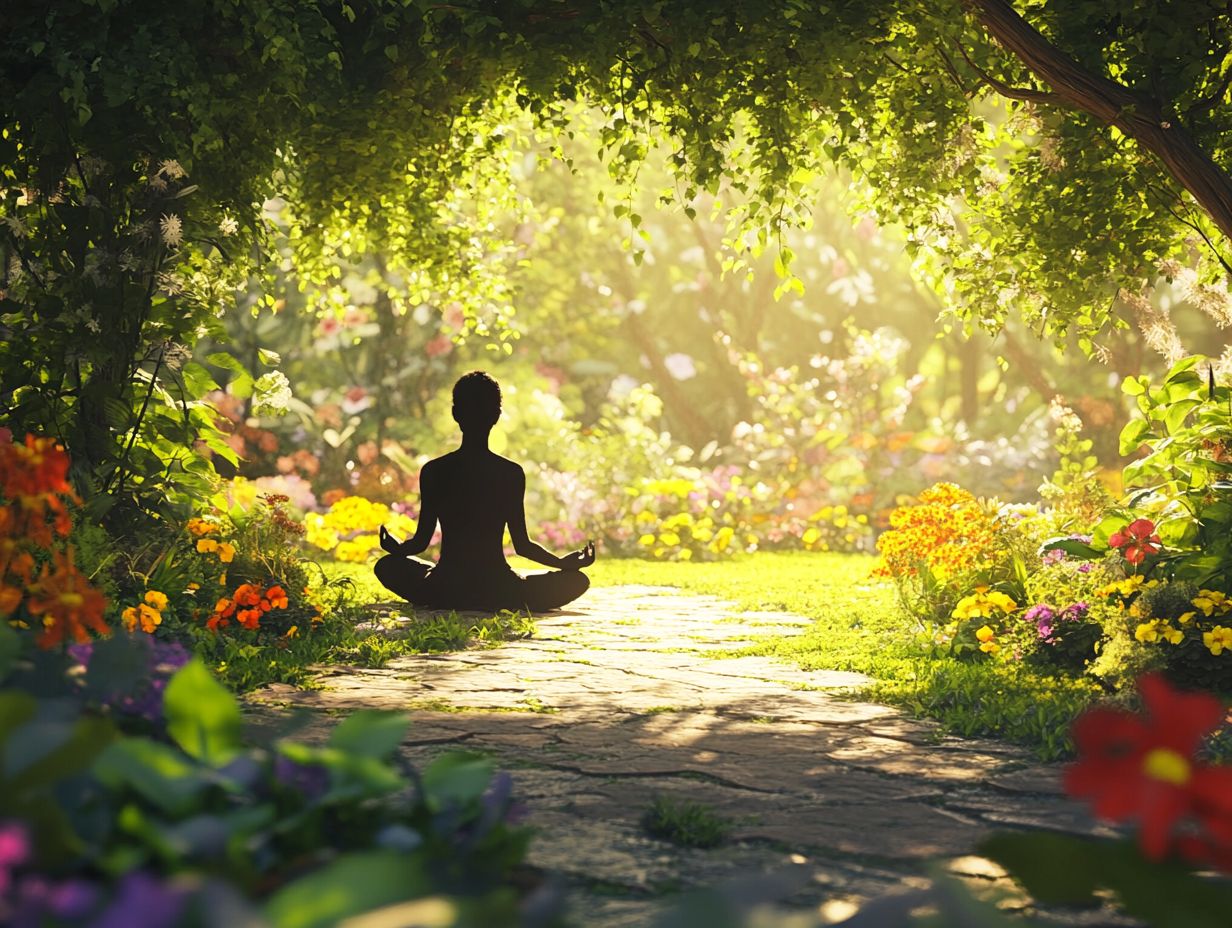
When you practice relaxation techniques, your body responds by activating the relaxation response, triggering a cascade of beneficial physiological changes. This response helps lower your heart rate and blood pressure while reducing muscle tension, significantly enhancing your overall health.
Techniques like deep breathing, progressive muscle relaxation, and guided imagery serve as powerful tools in this transformative process. For instance, deep breathing engages your diaphragm, boosting oxygen intake while soothing your nervous system. Progressive muscle relaxation invites you to systematically tense and then release muscle groups, resulting in a profound sense of calm.
These methods not only provide immediate stress relief but also foster a more balanced state of being over time. They illustrate the vital connection between your mind and body.
The Mental Benefits of Relaxation
The mental benefits of relaxation techniques are remarkable. They significantly contribute to stress management, cognitive function, and the enhancement of mental health.
By engaging in practices like mindfulness, meditation, and progressive muscle relaxation, you can reduce symptoms of anxiety disorders. You can also improve your sleep quality and cultivate positive coping strategies that elevate your daily functioning and emotional resilience.
Reducing Stress and Improving Mental Health
Reducing stress through relaxation techniques is crucial for enhancing mental health. It also helps alleviate emotional discomfort.
Methods such as mindfulness meditation, deep breathing exercises, and gentle yoga significantly foster a sense of calm and focus. Regular engagement in these techniques makes it easier to navigate daily stressors.
The cumulative effects of practicing relaxation regularly can elevate your well-being. This improvement boosts your personal happiness and positively influences your relationships and life satisfaction.
Therefore, prioritizing stress reduction is essential for your self-care routine.
Practicing Relaxation Techniques
Engaging in relaxation techniques like deep breathing, progressive muscle relaxation, and mindfulness meditation can yield remarkable health benefits. These practices significantly enhance both your physical and mental well-being.
Effective Methods for Relaxation
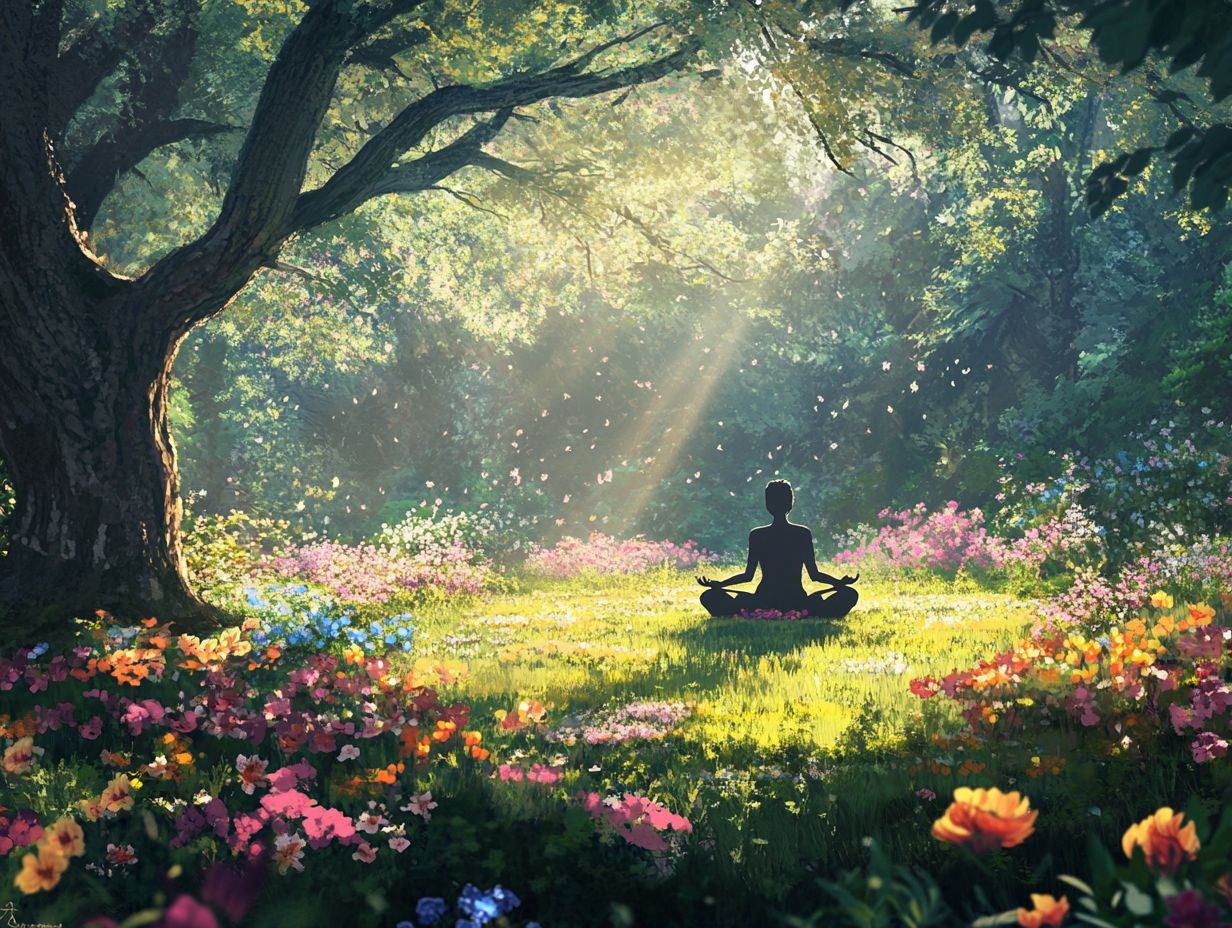
Effective methods for relaxation encompass practices like deep breathing, yoga, tai chi, and mindfulness. Each uniquely contributes to your stress reduction journey.
These techniques not only alleviate tension but also enhance your overall well-being. For instance, when you engage in deep breathing exercises, you feel an immediate sense of calm as your heart rate slows, and cortisol levels decrease.
Yoga intertwines physical postures with breath control, allowing you to connect with your body. This connection cultivates a profound sense of peace.
Tai chi, often called ‘meditation in motion,’ invites both your mind and body to engage in slow, graceful movements. This enhances your focus and balance.
Mindfulness encourages you to stay present, helping to quiet racing thoughts. You can practice this through simple activities like mindful eating or walking.
Each of these methods presents unique benefits tailored to different preferences, making them accessible and effective for anyone seeking relief from daily stressors.
Incorporating Relaxation into Daily Life
Don’t wait start incorporating relaxation into your daily life today for a happier, healthier you! You can easily integrate relaxation into your routine with a few thoughtful adjustments, such as committing to regular exercise and embracing a healthy diet.
Tips for Maintaining a Relaxing Lifestyle
To maintain a relaxing lifestyle, embrace practical tips that include regular exercise, a healthy diet, and a sense of humor. By weaving these elements into your daily routine, you can significantly lower your stress levels.
Regular exercise whether a brisk walk, yoga, or even dancing releases endorphins, those delightful mood boosters. A balanced diet rich in fruits, vegetables, and whole grains fuels your body and promotes mental clarity and emotional stability.
Don t underestimate the power of laughter! Whether it’s from a clever comedy show or shared jokes with friends, those joyful moments can brighten your day and foster emotional resilience.
Each of these components is vital in cultivating a serene and harmonious lifestyle. This enables you to manage stress more effectively and enjoy greater tranquility.
Frequently Asked Questions
1. What are relaxation techniques?
Relaxation techniques are practices that help reduce stress and promote a sense of calm. Examples include deep breathing and meditation.
2. How often should I practice relaxation techniques?
It’s beneficial to practice relaxation techniques daily to experience the best results for your mental health.
3. Can relaxation techniques help with anxiety?
Yes, many relaxation techniques can significantly reduce symptoms of anxiety and improve emotional resilience. For a deeper understanding of how the body processes these techniques, exploring understanding the detoxification pathways can be beneficial.
What is the science behind relaxation and how does it affect the body?

Relaxation science explores how various techniques help your body calm down and rest. When your body relaxes, it triggers physical changes like slowed breathing, a relaxed heart rate, less muscle tightness, and increased blood flow to the brain. These changes can have positive effects on your overall health and well-being.
What are the physical benefits of relaxation?
Relaxing offers many physical benefits. It reduces stress, lowers blood pressure, boosts your immune system, and helps you sleep better.
It can also alleviate symptoms of certain health conditions, such as chronic pain, headaches, and digestive issues.
Can relaxation improve mental health?
Yes, relaxation links to improved mental health by reducing symptoms of depression, boosting mood and self-esteem, and increasing feelings of well-being.
Regular relaxation practices, such as meditation, mindfulness, and deep breathing, can help manage and prevent mental health disorders, including anxiety disorders and chronic stress.
How does relaxation affect the nervous system?
When you relax, your body activates the calming system known as the parasympathetic nervous system, which helps counteract the “fight or flight” response of the sympathetic nervous system. This activation reduces stress and promotes a state of calmness. It can also positively affect blood pressure and stress hormones.
Are there different types of relaxation techniques?
Yes, there are many relaxation techniques to choose from. Examples include progressive muscle relaxation, guided imagery, meditation, yoga, and tai chi.
Each technique has unique benefits and may suit different individuals, so it’s important to find the right one for you.
How often should one practice relaxation techniques?
The frequency of relaxation practice varies for each person. Some may benefit from practicing daily, while others may find it helpful to practice a few times each week.
It’s crucial to find a routine that works for you and to make relaxation a regular part of your self-care routine for optimal benefits.


